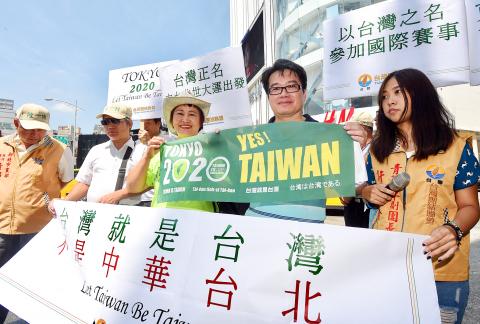Members of the Taiwan Solidarity Union (TSU) yesterday collected signatures on the streets of Taipei to petition for changing the name of the nation’s sports team from “Chinese Taipei” to “Taiwan,” joining a Japanese-launched initiative calling for Taiwan’s participation in the Tokyo Olympics in 2020 under the name “Taiwan.”
The Tokyo-based Taiwan 2020 Campaign Council has collected nearly 100,000 signatures to petition the Japanese parliament to allow the nation’s national team to join the Tokyo Olympics under the name, the TSU said.
“Taiwanese should be ashamed that such a name rectification campaign was launched by Japanese, while Taiwanese have done little to promote the cause,” TSU Deputy Secretary-General Wang Ming-yuan (王銘源) said.

Photo: Chien Jung-fong, Taipei Times
Japanese have organized the campaign, as they realized the need for a Taiwan-Japan alliance as both nations are under threat from China and North Korea, Wang said.
However, the majority of Taiwanese are ignorant of the perilous geopolitics that shape East Asian relations, he added.
The TSU staged a protest in April calling for the name change, but Sports Administration Director-General Lin Te-fu (林德福) said it would be impossible to change the name of national sports teams in the near-term and hardly anything had been done by the government, Wang said.
The TSU decided to join the Japanese initiative with civic campaigns and by collecting signatures from Taiwanese to send to the Japanese parliament, he said.
Following a similar campaign in Tokyo on Aug. 6 organized by the Taiwan United Nations Alliance, the TSU’s campaign was the second rally in a week to urge authorities to drop the name “Chinese Taipei.”
“Chinese Taipei,” a deliberately ambiguous term adopted in 1981, was a wrong decision made by the Chinese Nationalist Party (KMT), Wang said.
“The term confuses Taiwan with China, just like the confusion caused by the ‘Republic of China’ and the ‘People’s Republic of China,’” Wang said.
“Taiwan participates in the Olympics with an Olympics-styled flag instead of the national flag. Taiwan is not a second-rate nation and we should campaign for changing the title of national teams in the Tokyo Olympics,” he said.
Wang called on ultramarathon runner Kevin Lin (林義傑), who had condemned the critics of “Chinese Taipei” as ignorant of the realpolitik in the realm of international sports, to use his renown to urge the government to push for the name change to boost Taiwan’s international presence.
TSU executive member Huang Shu-chun (黃淑純) said Taiwanese are not Chinese and it is unacceptable for Taiwan’s national teams to carry a flag with the five-ring Olympics logo like the Refugee team.
Council director Nagayama Hideki is to visit Taiwan at the end of this month, during which the TSU is to give him the petitions to be delivered to the Japanese parliament and Japanese Olympic Committee, the TSU said.

DEFENDING DEMOCRACY: Taiwan shares the same values as those that fought in WWII, and nations must unite to halt the expansion of a new authoritarian bloc, Lai said The government yesterday held a commemoration ceremony for Victory in Europe (V-E) Day, joining the rest of the world for the first time to mark the anniversary of the end of World War II in Europe. Taiwan honoring V-E Day signifies “our growing connections with the international community,” President William Lai (賴清德) said at a reception in Taipei on the 80th anniversary of V-E Day. One of the major lessons of World War II is that “authoritarianism and aggression lead only to slaughter, tragedy and greater inequality,” Lai said. Even more importantly, the war also taught people that “those who cherish peace cannot

STEADFAST FRIEND: The bills encourage increased Taiwan-US engagement and address China’s distortion of UN Resolution 2758 to isolate Taiwan internationally The Presidential Office yesterday thanked the US House of Representatives for unanimously passing two Taiwan-related bills highlighting its solid support for Taiwan’s democracy and global participation, and for deepening bilateral relations. One of the bills, the Taiwan Assurance Implementation Act, requires the US Department of State to periodically review its guidelines for engagement with Taiwan, and report to the US Congress on the guidelines and plans to lift self-imposed limitations on US-Taiwan engagement. The other bill is the Taiwan International Solidarity Act, which clarifies that UN Resolution 2758 does not address the issue of the representation of Taiwan or its people in

US Indo-Pacific Commander Admiral Samuel Paparo on Friday expressed concern over the rate at which China is diversifying its military exercises, the Financial Times (FT) reported on Saturday. “The rates of change on the depth and breadth of their exercises is the one non-linear effect that I’ve seen in the last year that wakes me up at night or keeps me up at night,” Paparo was quoted by FT as saying while attending the annual Sedona Forum at the McCain Institute in Arizona. Paparo also expressed concern over the speed with which China was expanding its military. While the US

‘FALLACY’: Xi’s assertions that Taiwan was given to the PRC after WWII confused right and wrong, and were contrary to the facts, the Ministry of Foreign Affairs said The Ministry of Foreign Affairs yesterday called Chinese President Xi Jinping’s (習近平) claim that China historically has sovereignty over Taiwan “deceptive” and “contrary to the facts.” In an article published on Wednesday in the Russian state-run Rossiyskaya Gazeta, Xi said that this year not only marks 80 years since the end of World War II and the founding of the UN, but also “Taiwan’s restoration to China.” “A series of instruments with legal effect under international law, including the Cairo Declaration and the Potsdam Declaration have affirmed China’s sovereignty over Taiwan,” Xi wrote. “The historical and legal fact” of these documents, as well